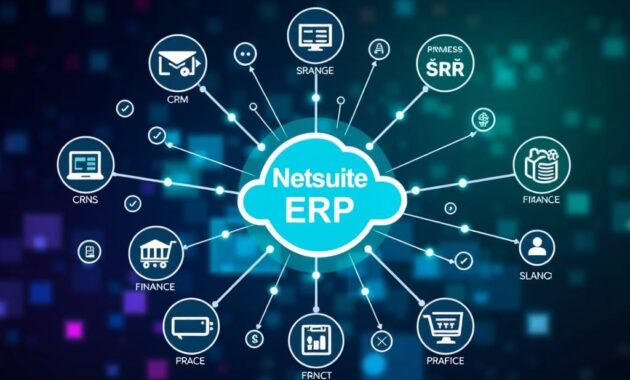Are you prepared to elevate your operations and unlock your business’s true potential? The netsuite erp overview offers a glimpse into how this advanced ERP solution enables organizations to optimize processes and boost efficiency. NetSuite ERP transcends conventional software, serving as a comprehensive toolkit for diverse business functions, thereby driving growth. It integrates cutting-edge features, facilitating informed decision-making that propels your enterprise forward. This empowers you to leverage the full range of ERP solutions, tailored to your specific requirements.
What is NetSuite ERP?
The comprehension of the netsuite ERP definition is imperative for entities aspiring to refine their operational frameworks. This cloud-based enterprise resource planning software amalgamates disparate functionalities into a singular platform, thereby augmenting both operational efficiency and collaborative dynamics. As entities expand, the necessity for an all-encompassing system to oversee financials, customer interactions, and supply chain functionalities becomes increasingly evident.
Definition and Core Features
NetSuite ERP proffers a myriad of core functionalities, meticulously crafted to cater to a broad spectrum of business exigencies. These encompass:
- Financial Management: Facilitates the streamlining of accounting, budgeting, and financial reporting processes.
- Customer Relationship Management (CRM): Empowers the effective management of customer interactions and sales pipelines.
- e-Commerce: Facilitates support for online sales and transactions.
- Inventory Management: Simplifies the tracking and fulfillment of inventory orders.
These core functionalities underscore NetSuite ERP’s role as a pivotal tool for businesses, addressing a multitude of operational necessities concurrently.
History and Evolution
The genesis of NetSuite ERP traces back to 1998, when it was initially established as NetLedger, marking the inception of cloud-based ERP solutions. Throughout its evolution, it has demonstrated adaptability to market demands and technological progressions. Currently, it enjoys widespread adoption by thousands of entities globally, solidifying its position as a preeminent entity within the ERP domain.
Key Industries That Benefit
Multiple sectors derive substantial benefits from the implementation of NetSuite ERP. Notably, these include:
- Retail: Enhances customer engagement and inventory control.
- Manufacturing: Optimizes production efficiency and supply chain management.
- Professional Services: Streamlines project management and billing processes.
Benefits of Using NetSuite ERP
Adopting NetSuite ERP introduces a plethora of advantages, significantly boosting your organization’s operational efficacy. It streamlines processes, encourages interdepartmental collaboration, and offers profound data insights. These benefits collectively contribute to a more efficient and agile business environment.
Streamlining Operations
NetSuite ERP transforms the management of daily tasks, automating mundane activities to minimize manual intervention. This reduction in manual effort not only alleviates the workload of your team but also enhances operational efficiency. Consequently, your business can redirect its resources towards strategic growth and innovation.
Real-Time Data Insights
NetSuite ERP empowers you with real-time data access, facilitating swift decision-making. It enables the analysis of metrics and trends as they occur, fostering a responsive approach to market dynamics. This agility is pivotal in driving superior business outcomes.
Enhanced Collaboration
Effective collaboration among departments is crucial for organizational success. NetSuite ERP facilitates seamless communication, ensuring all stakeholders are aligned with overarching goals. By dismantling departmental silos, your teams can collaborate more effectively, leading to increased productivity and unified efforts.
Key Components of NetSuite ERP
NetSuite ERP encompasses a comprehensive array of functionalities, designed to elevate your business operations. Grasping the fundamental components of NetSuite ERP is pivotal for optimizing your processes and boosting overall efficiency. The pivotal areas encompass financial management, CRM, and supply chain and inventory management.
Financial Management
The financial management module stands as a cornerstone within NetSuite ERP. It empowers you to adeptly manage budgeting, forecasting, and compliance. Real-time access to financial data enables more informed decision-making, thereby fortifying your capacity for future growth planning.
Customer Relationship Management (CRM)
CRM within NetSuite is instrumental in fostering robust customer relationships. It equips you to elevate customer engagement, streamline communication, and guide leads through the sales cycle. The integration of CRM functionalities enhances customer satisfaction and retention.
Supply Chain and Inventory Management
NetSuite’s supply chain and inventory management tools offer real-time inventory visibility, crucial for meeting customer demands. These tools enable precise inventory control, reducing excess stock and optimizing costs, thereby amplifying operational efficiency.
| Component | Description | Benefits |
|---|---|---|
| Financial Management | Handles budgeting, forecasting, and compliance. | Improved decision-making and financial control. |
| CRM | Enhances customer engagement and relationship building. | Stronger customer relationships and increased sales. |
| Supply Chain Management | Provides real-time oversight of inventory and logistics. | Optimized stock levels and reduced costs. |
How NetSuite ERP Supports Growth
Every enterprise aspires to growth, and NetSuite ERP is crafted to facilitate this trajectory. It establishes the foundational infrastructure for scalability, empowering you to expand without encountering system constraints. As your operations evolve, the platform evolves with you, ensuring uninterrupted functionality.
Scalability
NetSuite ERP’s scalability ensures that as your business’s size or complexity escalates, the software accommodates the increased workload. This capability liberates you to concentrate on strategic endeavors, unencumbered by technical hurdles. Whether through the addition of new users or the expansion of services, the system’s adaptability makes it ideal for companies at any growth phase.
Flexibility and Customization
The adaptability of NetSuite enables extensive customization to fulfill your distinct business needs. You can devise bespoke workflows, deploy specific modules, or tailor the system to various operational demands. This degree of customization enhances user engagement and ensures the software’s congruence with your business practices.
Global Reach
NetSuite ERP’s global reach facilitates international operations with ease. It accommodates multi-currency transactions and adheres to diverse regulatory frameworks, crucial for businesses catering to a broad clientele. Thus, your expansion endeavors can proceed without geographical barriers, preserving operational efficacy.
Implementing NetSuite ERP
The successful implementation of NetSuite ERP necessitates a meticulous approach, encompassing thorough planning and strategic execution. Central to this endeavor is the meticulous consideration of every detail during the rollout phase. Engaging stakeholders at an early stage and establishing a realistic timeline are crucial for a seamless transition.
Planning Your Implementation
Effective planning is paramount when embarking on the implementation of NetSuite ERP. It is imperative to identify and engage key stakeholders across your organization during the planning phase. Their insights are invaluable in shaping a clear timeline for the rollout. A meticulously structured project plan is essential for efficient resource management.
Data Migration Strategies
Data migration is a critical component of the NetSuite ERP implementation process. Ensuring the seamless transfer of existing data into the new system is paramount to avoid data loss. Strategies may include data cleansing, mapping, and staging. A thorough evaluation of your current data is necessary to devise a plan that addresses these elements, facilitating a smooth transition.
Training for Your Team
Team training is indispensable for the effective adoption of the new ERP system. Equipping your staff with the necessary skills enhances their ability to leverage NetSuite ERP efficiently. Comprehensive training sessions should cover the core functionalities and best practices. Encouraging ongoing learning fosters a proactive culture around the new system.
Integrating NetSuite ERP with Other Tools
The integration of NetSuite ERP with diverse tools significantly enhances business operations by ensuring a seamless flow of data and interoperability. By leveraging a multitude of integrations, businesses can harness the capabilities of renowned platforms such as Salesforce and Shopify. These integrations not only augment the functionality of NetSuite ERP but also streamline processes, thereby enhancing operational efficiency.
Popular Integrations
Several third-party applications can seamlessly integrate with NetSuite ERP. Below are some of the most prevalent integrations:
- Salesforce: Enhance customer relationship management by connecting CRM data with ERP functionalities.
- Shopify: Streamline e-commerce operations by integrating sales data directly into your financial management system.
- PayPal: Simplify payment processing by connecting your financial transactions to your ERP system.
- Mailchimp: Automate marketing efforts by syncing customer lists and campaign data with your ERP.
APIs and Custom Integrations
The understanding of APIs in NetSuite ERP integrations unveils a plethora of possibilities for bespoke solutions. APIs facilitate communication, data sharing, and action initiation between different software systems. This capability empowers businesses to craft integrations that precisely align with their specific requirements. By employing custom solutions, businesses can refine existing processes or introduce novel functionalities that are in perfect harmony with their operational needs.

| Integration | Benefits | Key Features |
|---|---|---|
| Salesforce | Improved customer insights | Data synchronization across platforms |
| Shopify | Efficient order management | Real-time financial reporting |
| PayPal | Simplified transactions | Automated payment updates |
| Mailchimp | Streamlined marketing | Integrated marketing analytics |
Cost Considerations for NetSuite ERP
Assessing the financial implications of NetSuite ERP is paramount for strategic decision-making. The exploration of various pricing models tailored to your organization’s specific requirements is a critical step. Implementing effective budgeting strategies is essential for managing both initial and recurring expenses. Furthermore, evaluating the return on investment will facilitate a comprehensive assessment of the system’s long-term financial benefits.
Pricing Models
NetSuite ERP presents a range of pricing models, each designed to meet the unique needs of different businesses. It is imperative to choose a model that harmonizes with your financial constraints and operational framework. The prevalent pricing options include:
- Subscription-based pricing: A fixed monthly or annual fee, contingent upon the number of users and selected features.
- Pay-per-use pricing: A usage-based model, offering flexibility, particularly beneficial for businesses with fluctuating demands.
Budgeting for Your Business
Optimal budgeting for NetSuite ERP is vital for maintaining your company’s financial stability. Consider the following when formulating your budget:
- Set aside funds for initial implementation costs, encompassing software customization and integration.
- Account for ongoing operational expenses, including subscription fees and support services.
- Include potential costs for training your team to ensure a seamless adoption of the system.
Understanding ROI
Establishing a precise return on investment metric is essential for evaluating the efficacy of NetSuite ERP implementation. By quantifying efficiency enhancements, productivity gains, and cost reductions, you can discern the financial impact of your investment. Continuous tracking of these metrics will enable a deeper understanding and justification of the netsuite ERP cost.
Customer Success Stories
An examination of netsuite ERP success stories unveils profound insights into its transformative impact on diverse business landscapes. These narratives, encompassing both the ascension of small enterprises and the metamorphosis of large corporations, underscore the palpable advantages of embracing NetSuite ERP. They serve as a testament to the platform’s capability to propel businesses forward.
Case Study: Small Business Growth
A small retailer, post-implementation of NetSuite ERP, witnessed exponential growth. The software’s automation of critical functions drastically diminished operational costs. It streamlined inventory management, enabling the business to meet customer demands with alacrity. Consequently, customer satisfaction soared, driven by precise order fulfillment and seamless communication. This exemplifies the potential for small businesses to leverage technology to achieve prominence in a fiercely competitive environment.
Case Study: Large Enterprise Transformation
A multinational entity, leveraging NetSuite ERP, harmonized its operations across a multitude of global sites. This transition catalyzed a leap in operational efficiency and data precision, critical for timely decision-making. The consolidation of financial management and supply chain functionalities under a unified platform offered a holistic operational perspective. This transformation not only optimized processes but also slashed costs, demonstrating the efficacy of NetSuite ERP in facilitating large-scale enterprise growth and strategic alignment.
Common Challenges and Solutions
As enterprises initiate their journey with NetSuite ERP, numerous obstacles may arise, complicating the adoption and implementation of this robust system. Addressing these netsuite ERP challenges necessitates the identification of key issues and their effective resolution. For successful integration, focus must be placed on overcoming implementation hurdles, enhancing user adoption, and ensuring continued support.
Implementation Hurdles
Many companies encounter implementation issues during the initial setup of NetSuite ERP. These challenges may include data discrepancies, integration complications, and insufficient project planning. To mitigate these hurdles:
- Conduct a thorough needs assessment before implementation.
- Utilize a staged approach, allowing for gradual integration.
- Engage experienced professionals to guide the process.
User Adoption Issues
Gaining acceptance and proficiency among users is crucial for the success of NetSuite ERP. User adoption issues often stem from resistance to change and lack of proper training. To promote user adoption:
- Involve your team early in the implementation process.
- Provide tailored training sessions that address specific roles.
- Encourage feedback to create a sense of ownership.
Ongoing Support
Even after a successful launch, your organization may experience unforeseen challenges. Maintaining effective support solutions is vital for long-term success. Consider these strategies for ongoing support:
- Establish a dedicated support team for quick issue resolution.
- Regularly update training materials to reflect system changes.
- Utilize community forums for shared knowledge and troubleshooting.

Getting Started with NetSuite ERP
Embarking on the journey to transform your business operations, initiating the use of NetSuite ERP represents a crucial milestone. The most efficacious approach to explore this solution is through its free trial or demo, enabling you to navigate the intuitive interface and discern its alignment with your business requirements. This experiential insight facilitates the evaluation of diverse features prior to making a definitive commitment.
Free Trial and Demos
NetSuite presents an unparalleled opportunity to test its capabilities through a free trial. By enrolling, you gain access to the platform’s full functionalities without any initial financial commitment. This trial serves not only to gauge the user experience but also to assess the software’s integration into your existing workflows.
Resources and Support
Beyond the trial, NetSuite offers a vast repository of resources to support your learning endeavors. This includes comprehensive documentation and community forums, providing answers to your inquiries and insights from other users. Such a wealth of information aids in overcoming challenges and optimizing the platform’s utilization.
Next Steps for Your Business
Following the exploration of features and the acquisition of resources, the subsequent steps involve assessing NetSuite ERP’s potential to enhance your operations. Evaluate your unique business needs and consider how integration can facilitate operational efficiency and growth. By meticulously planning and executing your transition, you empower your business to thrive with NetSuite ERP.



